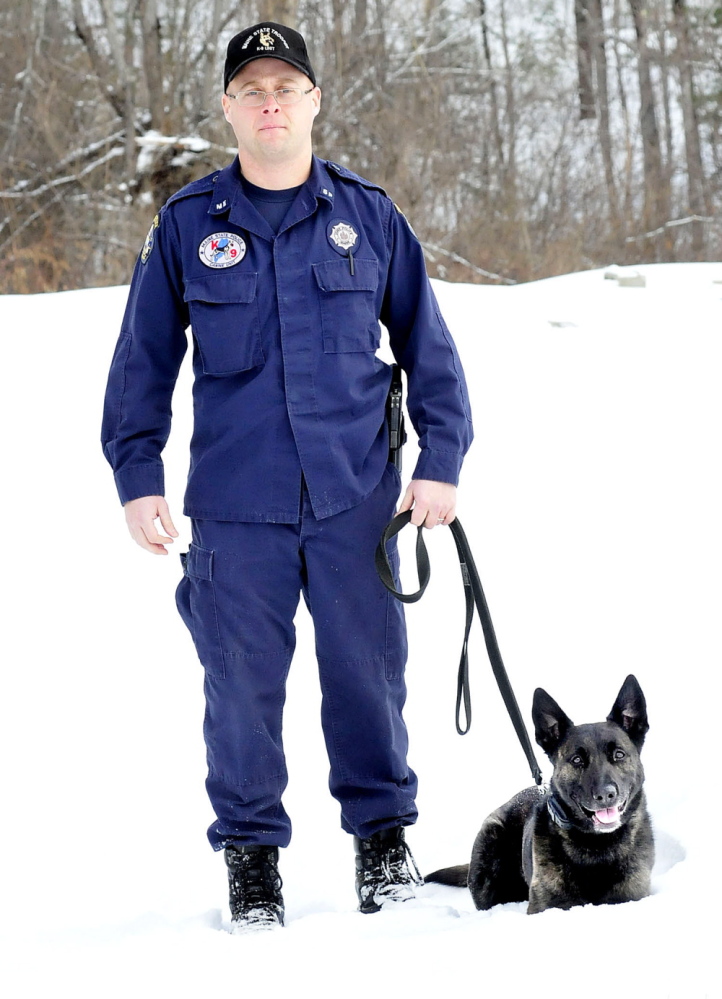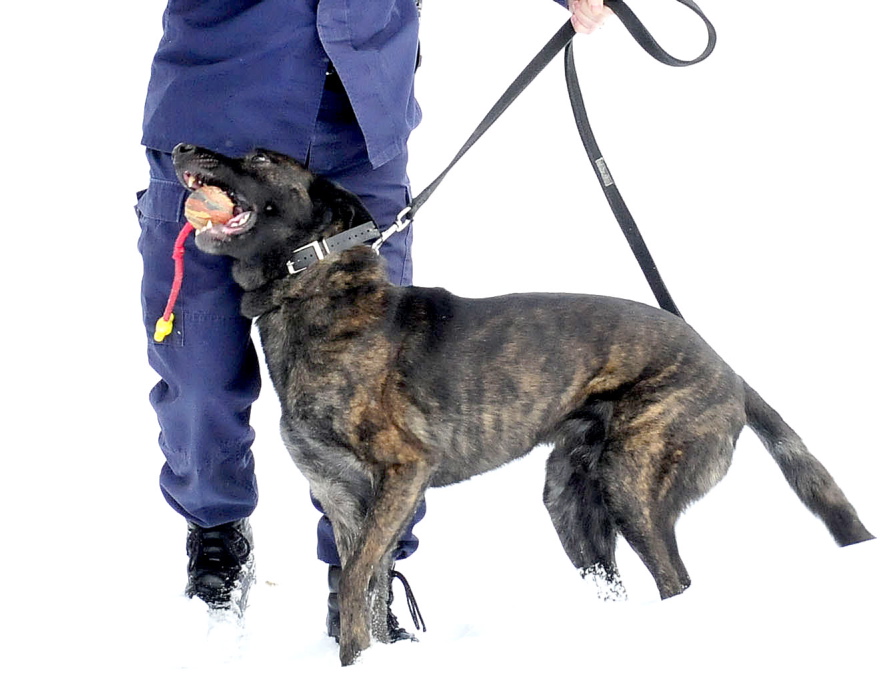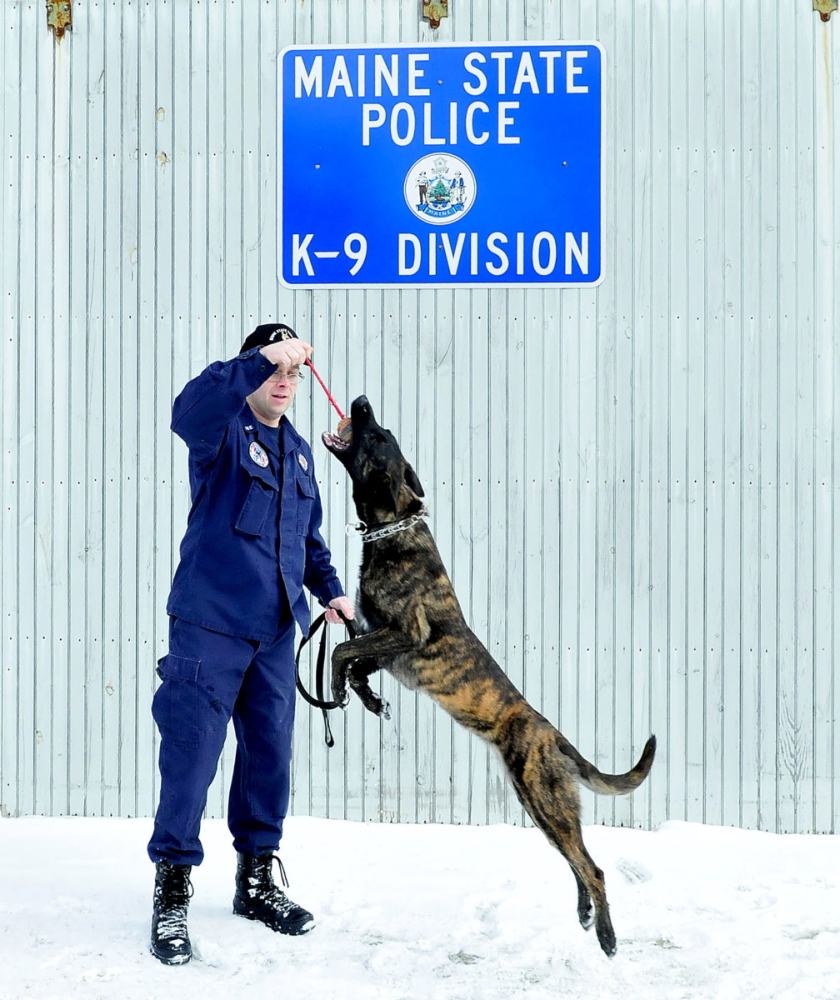VASSALBORO — Spike, an 8-year-old Dutch shepherd who responds to commands in both English and Dutch, will soon get a change of scenery.
Later this month, Spike and his companion in training, 18-month-old Ginger, also a Dutch shepherd, will move from patrol duties in Franklin County to the Maine State Police K-9 Training Center in Vassalboro.
Their handler, state police Trooper Scott Dalton, is to be promoted to sergeant Feb. 24 and will become the principal dog trainer for the agency’s 25 certified dog units. He takes over for Sgt. Blaine Bronson, who will become patrol sergeant for State Police Troop C in Skowhegan.
“I’m excited to get started,” said Dalton, a dog handler for the past 10 years of his 14 years as a state trooper. “I feel I got promoted because I have something to offer for the unit to move it forward.”
Dalton lives in Wilton with his wife and three children — and Spike and Ginger. He said the dogs are part of the family.
While Dalton’s new office is attached to the Maine Criminal Justice Academy in Vassalboro, his real workplace is Maine.
“Our home base is out of here, but we venture all over the state to do different training venues,” Dalton, 38, said Monday. “The dogs, if they had to search that training building over and over again to find drugs, they’re going to get really bored so we have to switch around. You’ve got to keep it interesting for the dogs.”
Calls for dog service include tracking lost people and searching for criminals who have fled a scene, such as bank robberies. The teams search for discarded evidence from a crime scene, track people hiding in woods or buildings, find illegal drugs and search for explosives.
The training center in Vassalboro offers 200 acres for practical training and a dog agility and confidence course. There is a 1,300-square-foot classroom and office building and a 7,800-square-foot training building.
The state police dog unit provides training not only for state troopers, but for municipal and county dog teams.
Dalton said the state unit has 19 patrol dog teams. The typical police dog is certified in obedience, tracking, apprehension and what Dalton calls bite work, in which the dog is ordered to actually bite someone who is fleeing or resisting.
The command for bite work: “get ‘em.” For uncovering drugs, it’s “find dope.”
The unit also has five bomb-sniffing dogs and one cadaver dog, which searches for human remains. Teams are certified under the New England State Police Administrators Conference and Maine Criminal Justice Academy standards. Their capabilities include open area searches, crime scene searches to include buildings and vehicles, fire scenes and water scenes.
Dalton said a dog’s sense of smell is so acute it can detect a human scent in water from a boat, in snow or from evidence buried in the ground.
The dog is not looking for a knife or a gun or an article of clothing, but is keyed in to the human scent. A drug dog also is trained to detect the odor of illegal drugs — cocaine, methamphetamine, heroin and marijuana — not prescription drugs, which are legal.
The smell of the illegal drugs is imprinted on the dog during training, so when it smells an illegal substance it records a hit and notifies its handler by sitting down where it detected the substance.
“Once they sit, they get their reward — usually for drug dogs and patrol dogs, the reward is a toy. For bomb dogs it’s a food reward for the most part,” Dalton said. “The sit is like an exclamation point at the end of a sentence. Just like with any other law enforcement function, the dog is only a tool.”
“We do get attached to our dogs,” he said. “Normally, a handler will see the dog all the way through their career and then at the time of retirement they’ll have the first option to take the dog home with them and most always they do. The hard part is when they die — they do become part of the family and do become bonded with family members.”
Retirement age for a police dog varies depending on the type of work it does, but generally they leave the job at about 10 years old.
Dalton said training for police dogs begins at about 18 months or two years of age and will last 14 weeks for patrol dogs, eight weeks for a drug dog. The next patrol school for the dog unit is in March. So far there are 10 dogs on the roster.
Doug Harlow — 612-2367 dharlow@centralmaine.com Twitter: @Doug_Harlow
Copy the Story LinkSend questions/comments to the editors.






Success. Please wait for the page to reload. If the page does not reload within 5 seconds, please refresh the page.
Enter your email and password to access comments.
Hi, to comment on stories you must . This profile is in addition to your subscription and website login.
Already have a commenting profile? .
Invalid username/password.
Please check your email to confirm and complete your registration.
Only subscribers are eligible to post comments. Please subscribe or login first for digital access. Here’s why.
Use the form below to reset your password. When you've submitted your account email, we will send an email with a reset code.